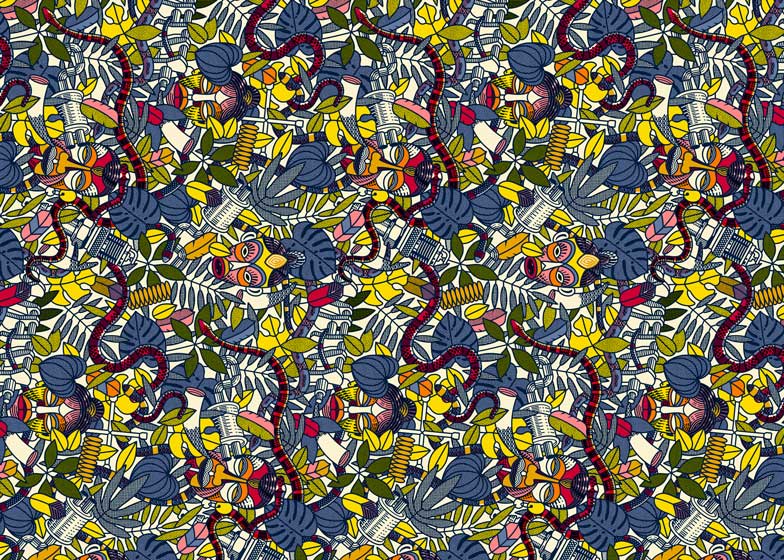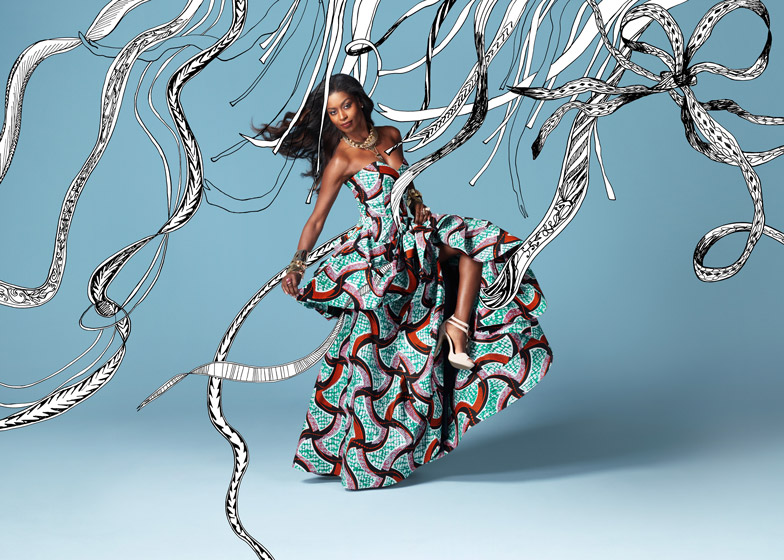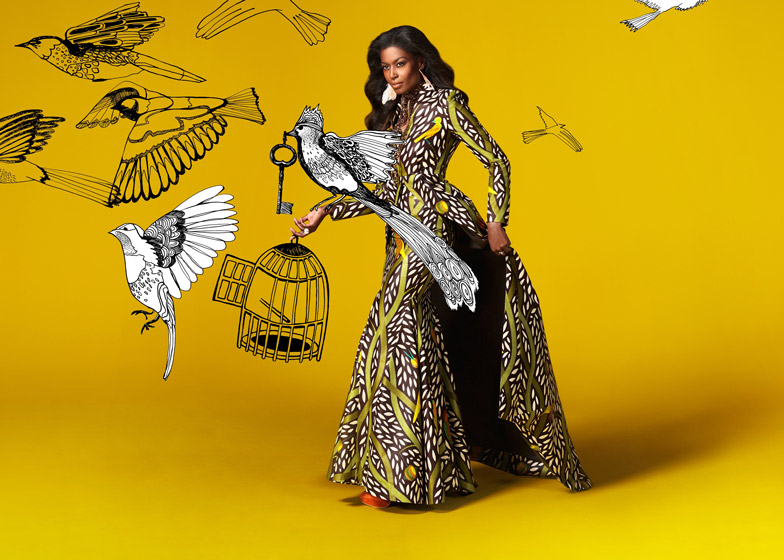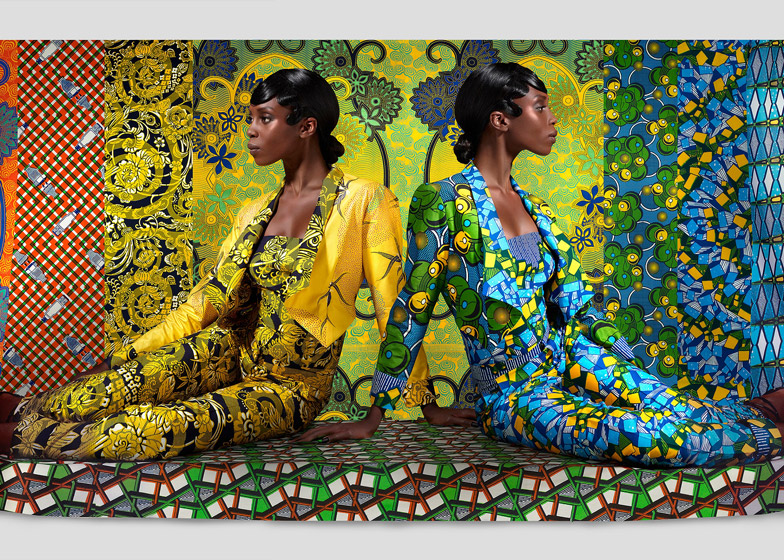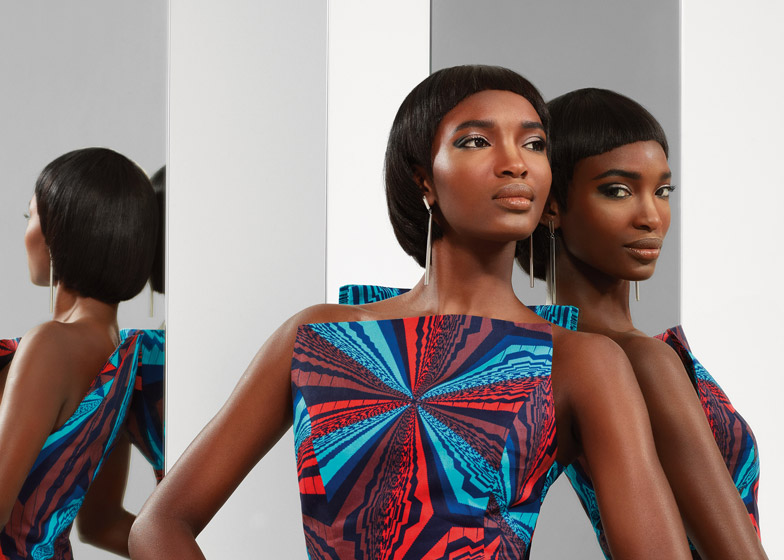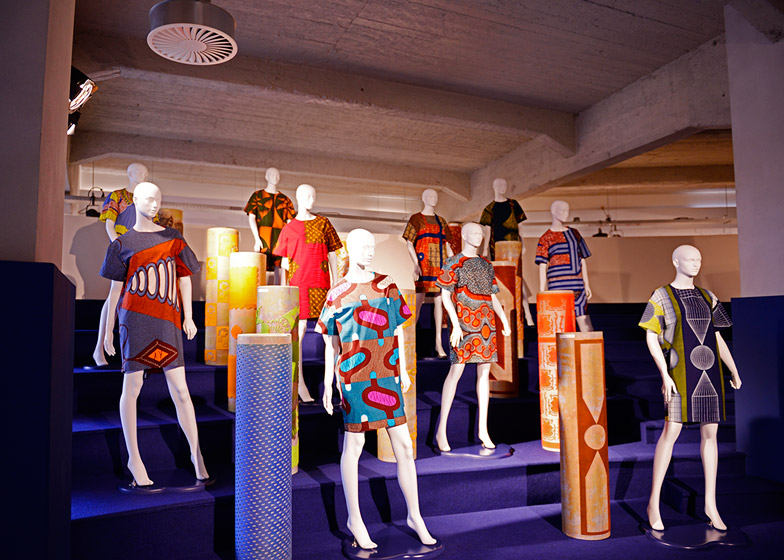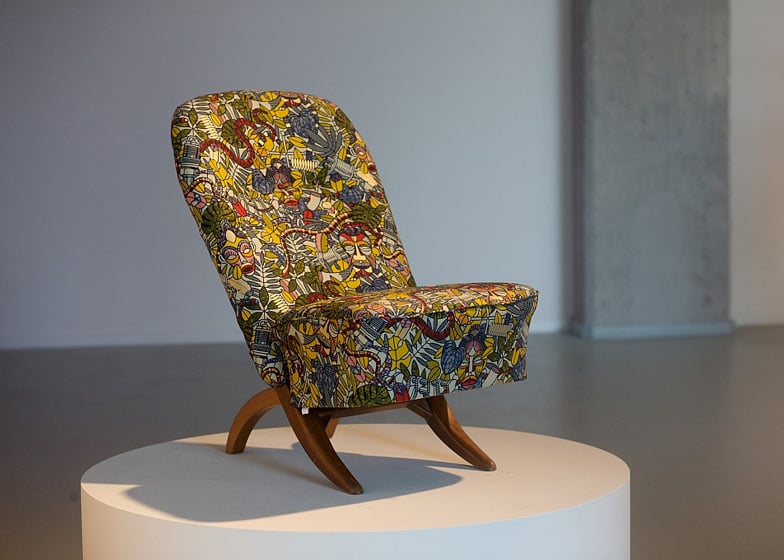Dutch Design Week 2013: a Dutch fashion textile brand that has a huge following in Africa but which is virtually unknown in Europe has announced a series of collaborations with contemporary designers (+ interview + slideshow).
Vlisco, a 167-year-old company that produces "grande, grotesque, outspoken" hand-printed textiles, staged an exhibition called Vlisco Unfolded exhibition in Eindhoven during Dutch Design Week, presenting its new collection, archive material and its company history as well as a one-off print produced in collaboration with Studio Job.
Vlisco's creative director Roger Gerards said the collaboration with Studio Job was the first in series of projects with external designers. "We want to do more and more," he told Dezeen. "There is a list of designers we are going to work with."
Vlisco, based in Helmond close to Eindhoven, employs 800 people in the Netherlands and has an in-house design team of 50 people, yet is barely known in its home country.
"There's a huge contradiction between how the brand is perceived in west Africa and how it's perceived here," said Gerards. "[But] I don't mind that much that people don't know us here. There are 400 million people living in west and central Africa and we are world famous there. You see people wearing us everywhere."
Vlisco was founded in 1846 and its signature fabrics, made using a 21-stage process involving wax-based batik techniques, soon found favour in Africa, where they were bartered by Dutch traders en route to Indonesia, which was the intended market.
The company started to develop bold, colourful prints for African customers and today has a symbiotic relationship with the region, where its products have become part of local folklore.
"In west Africa we're more than just design; we're also [part of the] culture," said Gerards. "People claim and adopt our products. When we have a fashion show in a city such as Lagos it's a huge event."
Vlisco, together with fabric brands it owns in Ghana and the Ivory Coast, produced 65 million yards of fabric in 2012. Its key markets are Cote d’Ivoire, Ghana, Togo, Benin, Central African Republic and Democratic Republic of Congo, as well as central and west African customers in major cities around the world.
The Vlisco Group, which employs 2,700 people worldwide, was bought in 2010 by British investment group Actis, which plans to help the brand double its business by 2015. It had a turnover of €225 million in 2011, an increase of 20% on the previous year.
The Vlisco Unfolded exhibition tells the story of the company and presents its products to the international design community for the first time.
Here's the transcript of the interview with Vlisco's creative director Roger Gerards:
Marcus Fairs: What is Vlisco?
Roger Gerards: Vlisco is a design brand based in this area of Eindhoven. We make textiles for west and central Africans living around the world. Besides the design we also manufacture in Holland. We have 800 people making our textiles.
Marcus Fairs: How did the company start?
Roger Gerards: More than 160 years ago a [Dutch] family bought a cotton printer. They had family in Indonesia and they started to make products for Indonesia using a batik technique. From 1900 on these products were also sold in west Africa and in this long relationship from then until today we've been making products for west African and central African consumers.
Marcus Fairs: How did the design of the fabrics evolve?
Roger Gerards: The imagery slowly changed from very Indonesian batik styles to our current DNA, which is very outspoken drawings and very bold colours which we developed ourselves. The product is the result of a lot connections, history and craft. Until today we still work with the wax batik technique, and we are the only company in the world doing that.
Marcus Fairs: Describe how the company is perceived in Africa.
Roger Gerards: What's beautiful about the Vlisco brand is that in west Africa we're more than just design; we're also [part of the] culture. People claim and adopt our products. When we have a fashion show in a city such as Lagos it's a huge event. People fly in from Canada, Dubai, all Nigerians from the whole world want to see the Vlisco fashion show. I always feel New York better in Lagos than in New York.
Marcus Fairs: It's strange that you're so unknown in Europe. Does that bother you?
Roger Gerards: There's a huge contradiction between how the brand is perceived in west Africa and how it's perceived here. I don't mind that much that people don't know us here. There are 400 million people living in west and central Africa and we are world famous there. You see people wearing us everywhere.
Marcus Fairs: Who designs the fabrics?
Roger Gerards: An important part of the company is that we have our own design department. We train our own designers because the technique and the DNA is so exceptional, you can't compare it with other companies. We have to train our own designers. So we have 20 textile designers from around the world and we have 30 people assisting them. Besides that in the Netherlands we have 700 people working in manufacturing.
Marcus Fairs: How are the fabrics made?
Roger Gerards: The manufacturing process is quite long. It takes 21 steps to make the product, and it takes two weeks from when the white cloth enters the factory to when it's finished.
Marcus Fairs: You said this would be the "first and last" time you'll exhibit at Dutch Design Week. Why are you doing it?
Roger Gerards: There are several reasons. Most importantly because we are in this area. People know Dutch design from the past, like Rietveld, very clean, very sober and very reflective. We are very outspoken, decorative - and we're Dutch design. It's totally made in a Dutch environment. We developed a new brand strategy in the last few years and we wanted to express that we are happy with the results. We are really growing a lot because of it and we're doing a lot of design developments and collaborations and I want to share this with the Dutch Design Week audience.
Marcus Fairs: Why have you collaborated with Studio Job on a limited-edition print?
Roger Gerards: I wanted to work with Studio Job because their design language and outspokenness and I feel a big concoction between what we are doing and what they are doing. All the fabrics that are worn by west Africans, they are very grande, very grotesque, very outspoken. It's about couture and having presence. I think Studio Job is also very iconic and outspoken. As we both are Dutch designers it's very good to make this connection. We made a limited edition fabric for this occasion but also he is using our fabrics for projects he is doing.
Marcus Fairs: Will you do more collaborations with contemporary designers?
Roger Gerards: Yes we want to do more and more. There is a list of designers we are going to work with.

